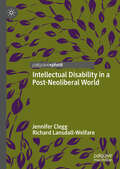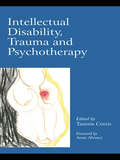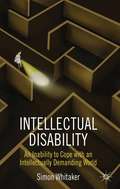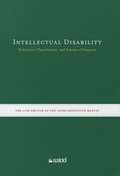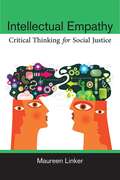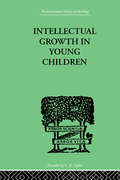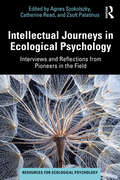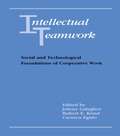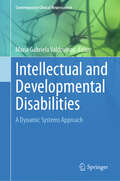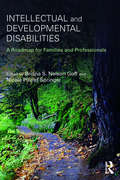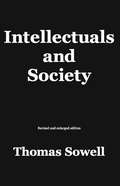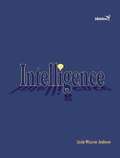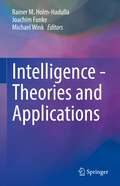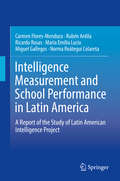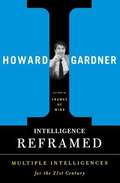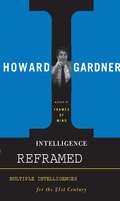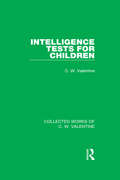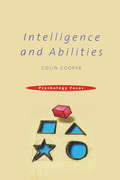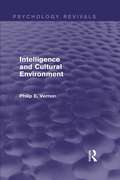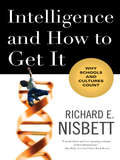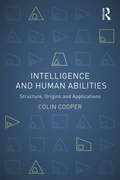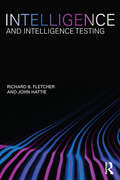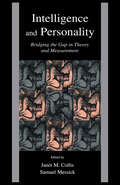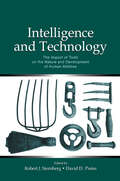- Table View
- List View
Intellectual Disability in a Post-Neoliberal World
by Jennifer Clegg Richard Lansdall-WelfareThis book suggests and promotes new paradigms for intellectual disability. Challenging the predominant neoliberal agenda, it combines extensive clinical experience, conceptual analysis, and recent research. The authors explore the way that promotion of autonomy and choice overlooks the fundamentally relational needs of people with intellectual disabilities by examining four significant, repeating themes. What neoliberal policies are and how they suffocate innovation; the recurring scandals that characterise ID services in all cultures; the counter-intuitive belief that behavioural interventions can somehow address emotional distress; and fundamental tensions in the relationship between parents and services. Each chapter proposes alternative and hopeful ways to address the 40% of people with intellectual disabilities whose distress generates challenges for parents and staff. Written primarily for intellectual disability researchers, professionals, service managers, and policy-makers, this book constitutes a useful reading also for scholars in psychology, psychiatry and nursing, as well as specialist historians, geographers, sociologists, and social anthropologists engaged with intellectual disabilities.
Intellectual Disability, Trauma and Psychotherapy
by Tamsin CottisPeople with intellectual disabilities have emotional and mental health needs just like anyone else. Until recently however there has been little research of effective psychological treatment or direct, accessible psychotherapy provision for this client group. Intellectual Disability, Trauma and Psychotherapy focuses on the delivery of psychotherapy services for those with intellectual disabilities. Leading professionals in this specialist field are brought together to describe the history, theory and practice of their work in twelve focused chapters that draw on the work of psychotherapists including Bion, Winnicott, Sinason and Alvarez. Topics covered include: therapeutic responses to cultural and religious diversity support for parents with intellectual disabilities developing healthy and secure attachments within the family dealing with intense feelings of shame helping clients to cope with traumatic sexual experiences. Drawing on over a decade of pioneering practitioner experience at Respond – a government-funded psychotherapy service for people with learning disabilities based in central London – this book explores the practical issues in providing therapy to this client group, whether individually, in families, in groups, or by the use of telephone counselling. It closes with a chapter exploring the way forward for those who wish to develop services of this kind.
Intellectual Disability: An Inability to Cope with an Intellectually Demanding World
by Simon WhitakerThe current construct of intellectual disability is based on the assumption that both IQ and adaptive behaviour can be measured accurately. Intellectual Disability explains how and why this is not fit for purpose and that it is actually neither necessary nor reasonable to have a single construct of intellectual disability.
Intellectual Disability: Definition, Classification, and Systems of Supports (Eleventh Edition)
by The AAIDD Ad Hoc Committee on Terminology ClassificationThis Manual contains the most current and authoritative information and knowledge on intellectual disability, including best practice guidelines on diagnosing and classifying intellectual disability and developing a system of supports for people living with an intellectual disability.
Intellectual Empathy: Critical Thinking For Social Justice
by Maureen LinkerIntellectual Empathy provides a step-by-step method for facilitating discussions of socially divisive issues. Maureen Linker, a philosophy professor at the University of Michigan–Dearborn, developed Intellectual Empathy after more than a decade of teaching critical thinking in metropolitan Detroit, one of the most racially and economically divided urban areas, at the crossroads of one of the Midwest’s largest Muslim communities. The skills acquired through Intellectual Empathy have proven to be significant for students who pursue careers in education, social work, law, business, and medicine. Now, Linker shows educators, activists, business managers, community leaders—anyone working toward fruitful dialogues about social differences—how potentially transformative conversations break down and how they can be repaired. Starting from Socrates’s injunction know thyself, Linker explains why interrogating our own beliefs is essential. In contrast to traditional approaches in logic that devalue emotion, Linker acknowledges the affective aspects of reasoning and how emotion is embedded in our understanding of self and other. Using examples from classroom dialogues, online comment forums, news media, and diversity training workshops, readers learn to recognize logical fallacies and critically, yet empathically, assess their own social biases, as well as the structural inequalities that perpetuate social injustice and divide us from each other.
Intellectual Growth In Young Children: With an Appendix on Children's "Why" Questions by Nathan Isaacs
by Isaacs, SusanRoutledge is now re-issuing this prestigious series of 204 volumes originally published between 1910 and 1965. The titles include works by key figures such asC.G. Jung, Sigmund Freud, Jean Piaget, Otto Rank, James Hillman, Erich Fromm, Karen Horney and Susan Isaacs. Each volume is available on its own, as part of a themed mini-set, or as part of a specially-priced 204-volume set. A brochure listing each title in the "International Library of Psychology" series is available upon request.
Intellectual Journeys in Ecological Psychology: Interviews and Reflections from Pioneers in the Field (Resources for Ecological Psychology Series)
by Agnes Szokolszky Catherine Read Zsolt PalatinusIntellectual Journeys in Ecological Psychology: Interviews and Reflections from Pioneers in the Field presents 12 in-depth interviews with prominent scientists associated with Ecological Psychology, rooted in James Gibson’s radical approach to perception. Featuring a mix of interviews conducted around the turn of the millennium with leading figures of Ecological Psychology, the book reveals discussions not previously found in publications and authentic personal perspectives about the early days of Ecological Psychology, a significant paradigm of post-cognitivist psychology. The interviews are supplemented by current reflections that bridge the past to the present. Each interview chapter also contains a brief biography of the interviewee and a list of their top ten most significant publications. An introductory chapter by Harry Heft provides an overview of Gibson’s theory and the post-Gibsonian theoretical landscape. A further chapter by the editors highlights lineages and patterns in the scientific careers and work of the interviewees. An epilogue by William Warren concludes the volume, addressing the current state and directions of Ecological Psychology. In the Appendix photographs taken by Sverker Runeson in the 1960s and 1970s show scenes and actors from scientific event in Ecological Psychology. This book will be beneficial to all researchers and students in the international community of Ecological Psychology. It will also serve as a starting point for those who wish to learn more about the movement and origins of Ecological Psychology.
Intellectual Teamwork: Social and Technological Foundations of Cooperative Work
by Robert E. Kraut Jolene Galegher Carmen EgidoThis book seeks to establish an interdisciplinary, applied social scientific model for researchers and students that advocates a cooperative effort between machines and people. After showing that basic research on social processes offers much needed guidance for those creating technology and designing tools for group work, its papers demonstrate the mutual relevance of social science and information system design, and encourage better integration of these disciplines. This comprehensive collection closely examines the variety of electronic tools being deployed to solve traditional problems in communication and coordination. Unfortunately, research shows that these tools have not been as successful as their designers had envisioned, partially because they were not always produced with the needs and goals of their human users in mind. The editors' goal is to entice more social scientists to orient their research around questions of practical interest to information system designers and to convince designers to search for the knowledge about social and organizational behavior that would make their tools more useful.
Intellectual and Developmental Disabilities: A Dynamic Systems Approach (Contemporary Clinical Neuroscience)
by Maria Gabriela ValdovinosThis new reference provides a comprehensive overview of intellectual and developmental disabilities, incorporating multiple perspectives and disciplines (including developmental neuroscience, genetics, psychiatry, and psychology) with a multifaceted approach, offering readers appreciation for the richness of the population and field. It provides readers with an understanding of the developmental, biological, and behavioral aspects of developmental disabilities with the aim of understanding their causes, the differences between disabilities, and familiarity with the prognosis and developmental outcomes for children diagnosed with various developmental disabilities.
Intellectual and Developmental Disabilities: A Roadmap for Families and Professionals
by Briana S. Nelson Goff Nicole Piland SpringerIntellectual and Developmental Disabilities provides a unique contribution not currently available in the professional literature by addressing the experiences and perspectives of families living with or raising a child with a disability. Designed for family therapists, social workers, and other helping professionals, it provides empirically-based, practical information for working with families experiencing intellectual and developmental disabilities of a loved one. This book also provides important information for navigating the various professional systems of care with which these families interface: health care providers, early childhood intervention teams, educational systems, the legal system, and financial planners.
Intellectuals and Society
by Thomas SowellHow intellectuals as a class affect modern societies by shaping the climate of opinion in which official policies develop--on issues ranging from economics to law to war and peace
Intelligence
by Linda Wasmer AndrewsWhat is intelligence? Is it solving a difficult math problem, knowing how to build a skateboard, or having good social skills? Depending on your point of view and the culture you live in, any one of these answers may be correct. Intelligence takes a closer look at what it means to be smart. Find out how scientists test intelligence and how new ideas are being used in the classroom. You can even learn how to make the most of your brainpower with a few simple tips. Life Balance navigates the challenges of everyday life. Featuring real-life situations and helpful resources, each book gives readers the tools they need to make positive changes and smart decisions. Filled with facts, advice, and solutions, Life Balance is about finding the way to a healthy and happy life.
Intelligence - Theories and Applications
by Michael Wink Joachim Funke Rainer M. Holm-HadullaIntelligence allows people to understand events and to shape their surrounding environment. This book delves deeper into the theories and applications of intelligence, showing it is a multifaceted concept —defined and explained differently by prestigious experts of various disciplines in their own research. The book provides interdisciplinary connections of intelligence as it relates to a variety of clearly outlined subject areas, and should lead to a deep understanding of the phenomenon as it pertains to practical applications in different domains. Contributors in this volume present results from evolutionary biology, mathematics, artificial intelligence, medicine, psychology, cultural studies, economy, political sciences and philosophy. Individual scientific models are integrated in an interdisciplinary concept of wisdom. This volume will help enhance the common understanding of intelligence for fellow researchers and scientists alike.
Intelligence Information Thinking
by Edward De BonoEdward de Bono has been called 'the father of thinking about thinking'. He is the originator of the concept - and formal tools - of Lateral Thinking. He is regarded by many as the leading authority in the field of creative thinking, innovation and the direct teaching of thinking as a skill.
Intelligence Measurement and School Performance in Latin America: A Report of the Study of Latin American Intelligence Project
by Carmen Flores-Mendoza Rubén Ardila Ricardo Rosas María Emilia Lucio Miguel Gallegos Norma Reátegui ColaretaThis book presents the results of the most complete and updated assessment of cognitive resources of students in Latin America: the Study of Latin American Intelligence (SLATINT). During four years, top researchers of the region used a standardized set of cognitive measures to assess 4,000 students aged between 14 and 15 years from six countries: Brazil, Argentina, Mexico, Chile, Colombia and Peru. The data collected and now analyzed in this volume is a first step to understand the human cognitive capital of the region, a crucial resource for any country today. Intelligence research has shown that the cognitive skills of a population are strongly associated with the school performance of its students and the development of a nation. This makes Intelligence Measurement and School Performance in Latin America a valuable tool both for Latin American researchers and authorities engaged in the improvement of each country’s human resources and for psychologists, educators and other social scientists dedicated to the study of the impact of intelligence in the development of nations.
Intelligence Reframed: Multiple Intelligences for the 21st Century
by Howard GardnerGardner (cognition and education, Harvard U.) broadens his theory of multiple intelligences first posited in 1983 to include intelligences of the existential and naturalist types and multiple forms of creativity. The McArthur genius award recipient advises on applications of his theory, responds to critics, and provides global contacts on MI theory.
Intelligence Reframed: Multiple Intelligences for the 21st Century
by Howard GardnerHarvard psychologist Howard Gardner has been acclaimed as the most influential educational theorist since John Dewey. His ideas about intelligence and creativity - explicated in such bestselling books as Frames of Mind and Multiple Intelligences (over 200,000 copies in print combined) - have revolutionized our thinking. In his groundbreaking 1983 book Frames of Mind, Howard Gardner first introduced the theory of multiple intelligences, which posits that intelligence is more than a single property of the human mind. That theory has become widely accepted as one of the seminal ideas of the twentieth century and continues to attract attention all over the world. Now in Intelligence Reframed, Gardner provides a much-needed report on the theory, its evolution and revisions. He offers practical guidance on the educational uses of the theory and responds to the critiques leveled against him. He also introduces two new intelligences (existential intelligence and naturalist intelligence) and argues that the concept of intelligence should be broadened, but not so absurdly that it includes every human virtue and value. Ultimately, argues Gardner, possessing a basic set of seven or eight intelligences is not only a unique trademark of the human species, but also perhaps even a working definition of the species. Gardner also offers provocative ideas about creativity, leadership, and moral excellence, and speculates about the relationship between multiple intelligences and the world of work in the future.
Intelligence Tests for Children (Collected Works of C.W. Valentine)
by C.W. ValentineOriginally published in 1945, this title was intended mainly for use by teachers wishing to test children from ages 2-8 in order to establish their intelligence. Based on feedback to the author, this revised edition also includes tests for children up to the age of 15. The tests were used to give a teacher some idea of how much could be expected of each child, so that the class, when practicable, could be divided into groups of varying abilities, which could proceed at paces suited to their respective capacities. It was felt that if ‘inborn intellectual deficiencies’ could be identified at an early age the children could have ‘special treatment’, or in certain cases be placed in a ‘special school’, rather than be potentially written off as ‘lazy’. Today this can be read and enjoyed in its historical context.
Intelligence and Abilities
by Colin CooperResearch into abilities is one of the great success stories of psychology. Ability tests are widely used and there is continued interest in the origins of abilites (enes or environment?) and their links to social phenomena such as crime and welfare dependecy. Intelligence and Abilities explains what is known about the processes associated with mental abilities and the relationship of abilities to behaviour. It also provides a clear and up-to-date guide to the main areas of research.
Intelligence and Cultural Environment (Psychology Revivals)
by Philip E. VernonOriginally published in 1969, Intelligence and Cultural Environment looks at the concept of intelligence and the factors influencing the mental development of children, including health and nutrition, as well as child-rearing practices. It goes on to discuss the application of intelligence tests in non-Western countries and includes both British and cross-cultural studies to illustrate this. Inevitably a product of the time in which it was written, this book nonetheless makes a valuable contribution to intelligence theory as we know it today.
Intelligence and How to Get It: Why Schools and Cultures Count
by Richard E. Nisbett"[Nisbett] weighs in forcefully and articulately . . . [using] a thoroughly appealing style to engage . . . throughout."--Publishers Weekly Who are smarter, Asians or Westerners? Are there genetic explanations for group differences in test scores? From the damning research of The Bell Curve to the more recent controversy surrounding geneticist James Watson's statements, one factor has been consistently left out of the equation: culture. In the tradition of Stephen Jay Gould's The Mismeasure of Man, world-class social psychologist Richard E. Nisbett takes on the idea of intelligence as biologically determined and impervious to culture with vast implications for the role of education as it relates to social and economic development. Intelligence and How to Get It asserts that intellect is not primarily genetic but is principally determined by societal influences.
Intelligence and Human Abilities: Structure, Origins and Applications
by Colin CooperChoice Recommended Read Psychological research into human intelligence and abilities presents us with a number of difficult questions: Are human abilities explained by a single core intelligence or by multiple intelligences? How should abilities be assessed? With tests unlike the problems which people normally have to solve, or with practical problems closer to those encountered in life, school and work? Do ability tests predict how a person will behave? If so, can they predict whether a person will succeed at school and at work? Intelligence and Human Abilities critically evaluates research evidence from the past 100 years to consider these and other issues. It shows that, despite the apparent contradictions in this research, the evidence in fact supports one coherent model, a fact which has clear implications for researchers, educators and test-users. This clear and engaging text provides an up-to-date evaluation of what the empirical evidence tells us about the number, nature and origins of human abilities. It will be essential reading for students and practitioners of psychology and education, and also for users of ability tests such as applied psychologists and personnel managers.
Intelligence and Intelligence Testing
by John Hattie Richard B FletcherHave you ever wondered what IQ is and how it is measured? Why is there such a premium placed on high IQ? What do we mean by intelligence? What does your IQ score mean? There can be no denying the enduring appeal of IQ over the last century. It is probably one of the most misunderstood yet highly researched psychological constructs ever. Such has been the controversy surrounding this topic that it is difficult to distinguish fact from fiction. Intelligence and Intelligence Testing is a text that aims to address that. This book examines the controversial psychological construct that is IQ, discussing and reviewing the history and current status of the research on intelligence and providing an overview of its development, measurement and use. From Galton, Spearman and Binet to the relatively recent controversy caused by the research of Herrnstein and Murray, this important book makes a major claim about the importance today of ‘problem solving on demand’ as one of the key components of today’s notions of intelligence. Chapters include coverage of: Intelligence and schooling; Cultural differences in views of intelligence; The history of IQ testing and its emergence into public consciousness; IQ as predictor of educational and occupational outcomes; Psychometrics and measurement of intelligence; The future of intelligence research. Written by Richard B. Fletcher and John Hattie, the author of the highly-regarded Visible Learning, this textbook will be invaluable for all undergraduate and Masters level students studying the theory of intelligence and the impact of testing on educational. Detailed and annotated further reading lists and a glossary of terms are also included.
Intelligence and Personality: Bridging the Gap in Theory and Measurement
by Janet M. Collis Samuel MessickThis volume brings together leading researchers in a major new effort to bridge the historical gap between the domains of ability and personality. The result is a remarkable collection of chapters analyzing critical issues at the interface--style, structure, process, and context. Contributors address: * intelligence and its relation to temperament and character-hierarchical models of cognition and personality; judgmental data in personality research; and structural issues in ability and personality; * intelligence and conation-goal theories; the role of conation in the learning environment; motivation and arousal; * intelligence and style-stylistic preferences; the role of disposition; cognitive style and its measurement; test taking style; and * intelligence and personality in context-regularities of functioning; contextual effects in cultural variation; control and consistency; the concept of "successful intelligence."
Intelligence and Technology: The Impact of Tools on the Nature and Development of Human Abilities (Educational Psychology Ser.)
by Robert J. Sternberg David D. PreissIn this volume, Robert J. Sternberg and David D. Preiss bring together different perspectives on understanding the impact of various technologies on human abilities, competencies, and expertise. The inclusive range of historical, comparative, sociocultural, cognitive, educational, industrial/organizational, and human factors approaches will stimula
